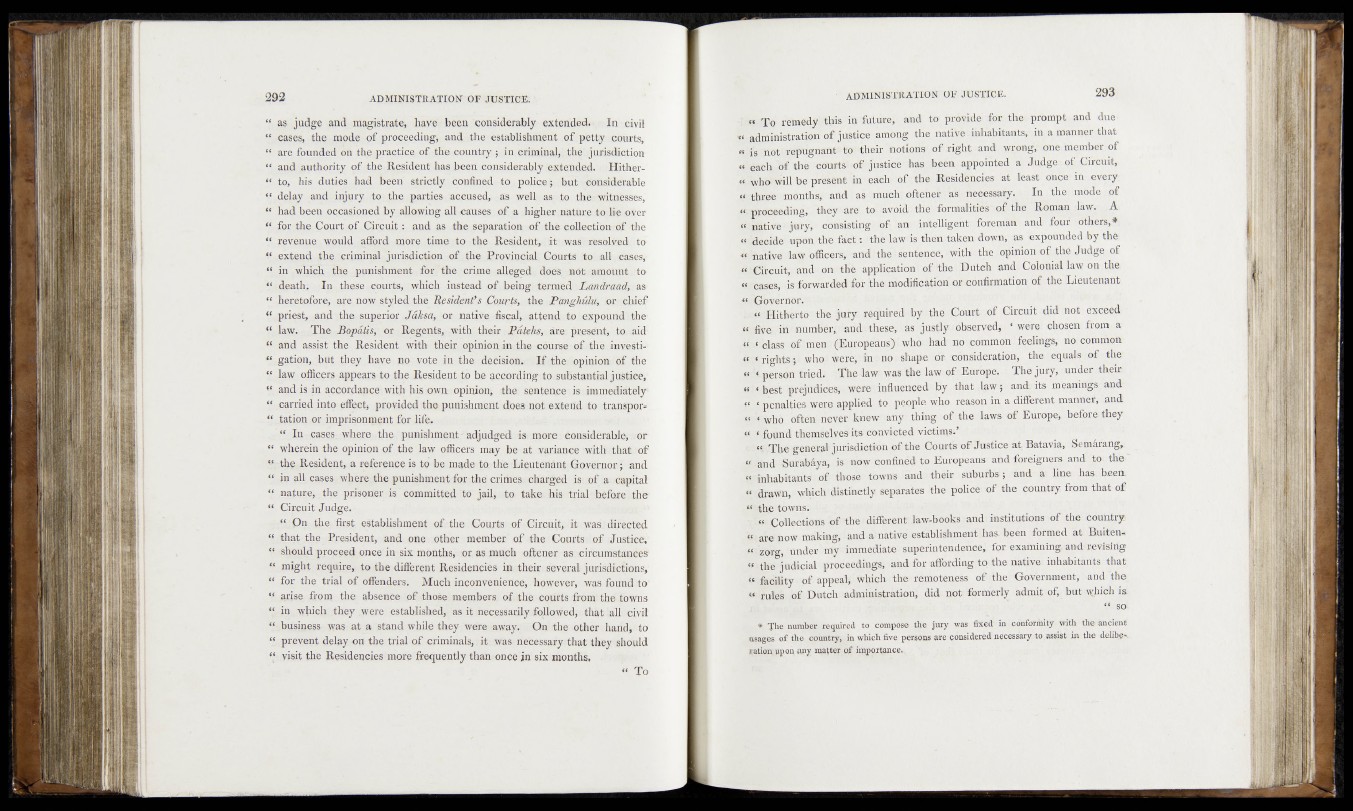
1 as judge and magistrate, have1 been'considerably extended. • In civil
“ cases, the mode ;-pf proceeding, ancQithe establishment .of.petty .courts,
“ are founded on the .practice of-the country jyjin.criminal,, the jurisdiction
“ and authority of the Resident hasjseen considerably extended. Ilither-
“ to, his duties had been' strictly confined -to police; but ^considerable
‘.‘ delay and injury to the parties accused» as well as to the ■wirifesjses,
“ had been occasioned |>y allowing all ca’uses. of a higher nature to lig dyer
“ for the Court of Circuit: and as the separation of the collection of‘‘the
“ revenue would afford more time.to the Resident,.; i t ’was resolved to
‘I extend the criminal jurisdiction of the .Provincial, Courts' to all .cases,-
‘‘ in .which the punishment, for the crime alleged . doe's, ndt amounaslto
‘‘.death; In. «these courts, which instead of,being termed Lamdraad, as*
“ heretofore, are now styled the Resident's Courts,, the P'anghulu, orj »chief
“ priest, and the superior Jdksa, or native, fiscal, attend, to expound' the
“ law. - The Bopdtis, or Regents, with their, Bdtebs, are present, to, Aid
“ and assist the Resident with their opinion in the course of. Hie inyesti-
“ gation, but they have no vote in the decision-.'1 If.thedopiniomlofriebe
“ law: officers appears to the Resident to he according to substantial justice,
“ and is jn accordance with his own..opinion; the- sentpnpe : is immediately-
“ carried into effect, provided the punishment does nfit- extedd to tcanspor-
tation or imprisonment for life,.| f
. “ In cases, where the punishment" adjudged is. more, considerable, /or
“ wherein the opinion of the law officers may be at variance withhthat tof
“-the„Resident, a reference is to be made ta-the 'Lieuteriant' Go.v.ernorr • and
“ In all cases-where the punishment for the crimes, charged iscof a capital
‘‘ nature,; the' prisoner-is committed'to jail, to tak&.-ihis: triafkdm’e ;<fche
“ Circuit Judge» _
Pn the;, first establishment of the Courts of. Circuit,-it was.1 d^etted
“..that the President,-.and one other member ofthe Cqattsitof idusticeV
“ should proceed once in-six months, or as much oftener as circumstances
“ might require, to the different Residencies in their several jurisdictions,
“ for the trial of offenders. Much inconvenience,. however, was found to'
V arise, from the absence of those members, of. fhe-courts from'th^.,toWns;
“ in which they .were established, as it necessarily .fqllowed,'that !all civil
“ ^business was at a stand while they-were-away. " Qn the .other hand,- to
“ prevent delay.*,on the trial of criminals,. it was necessary that they^should
“ visit the Residencies more frequently than once in six months, .
I To
« To remedyi^is-’lnifoture, and to provide,'.'for' therpromptj and due.
xi administration' of justice among the native-inhabitants, in, a manner that
« ü ■ hot1 topUgnatitafdWHelr 'noti’orist oft‘right.'and; wrpngf one membet of
“ each of thé< coTiTtlDp'fi'ïJ(isfi6e has .hpèn Capp'omted a Judge i ©^Circuit,
be present-mJ>eaCh>!&flthé Residencies at least oUce-Tp „every:
„three months,* and as -'.muchjpfteheH ^/Kejsessary. In rife. mode pf
“• proceeding, théyvare' of -the Roman -law. .A
n’ative Ij^fy;» -an iffteÜigehti.-jforemaft and’ four-others,*
‘«»decide upon thé faétri «ylj'è.laWsiS then fi'©W'ü> as expohii^pd by the;
“ native law officers; 'and Thfei fenfence,. with' the -opinionmjl^f-Judi^
“ fSircuitr,- and -VOnftKe appliGati®^n\idf'%he.i fi^dtch and^C^Igfial law on the.
« 'cases, is forwarded1 fox theimodifioation^irconfiunatipn of »the ‘Lieutenant
|&bvérnor.'' ^ ^ - f- r * _ ' _ _ u
be“ Hitherto the jury requited-tby-the jEtaurt'of Circuit ^diddiot^ éxceêd»
.“«fivq.dn mlnfifer, and.these, as ’jüstlynóbsejvedy. ‘ .were] chosen'from at
«-‘.'class.-.pf imen-;4Eöropeartój)a who: had- no[edmmon. ^ejih^y notcommo'n
“ »‘ lights?^ whöji were;»kit.no shape ba 'consideration, the equalsxof the
«^person tried.. ' The law was the lawaofnEurbpe. : ThêjUEy?,.under ;.them
“ È>‘HheSt prejudices, * were influenced- by ,-fehat -law; andbsts meanings and
tt penalties iWere applied to^pepplq^ho reaso.n jn^ a-diffe,rentJmann.er,l‘ ,and
*‘-‘,who 'oftén-mever knew any thing-* of. the, laws ©f Rurope,( .beforé'they
“ Bfeünd its' -convicted victims.5
^ ‘HTbe general 'jurisdictiën, ofthe 'Goürts o f Justice, it; Batav|h;r',^inaTarig,
-Surabiya, is'j-tioW confined to.Europeans- ami''tot, the*
,^habtta*hWiof those towns, andotlfeir suburbs-; and A Ijne, has been.
“ drawn, ‘-which1 distinctly separates thé police*»of the feountry from that of
“febhpdoiWnsi *W • r <■> ’ I &jy . '
' jColkorions of the-different! law-books t and» institutions ,of >the, country»
“J. are now making, >and a* native -establishment'JfSsUtfe&i rfdfmcd. a t Ruiten,
toizorg. iündèB my immediate smperi-ptendencej fpr.-'examining andwovisirig
“ >tbe judicial proceedings, apd for affording .'tq^he native: inhabitiffts- 'that;
« fadtervof appeal;' which the»<rpmoteness of 'thenöó^rnment, i^hd 'thq
« Ifuipfe o f Dutch .administration, did not.' fermerl^ admit
. * The numb.ef.,required to compose the. jury was ftxfecr- imrc&ïormity; with
usages ofthe country; .in which five persons etc-.considered necessary, to assist in the delihs*»
ration upon any matter of importance.